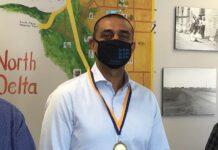BY INDIRA PRAHST
Instructor, Department of Sociology and Anthropology
Langara College
Vancouver

All photos courtesy Indira Prahst
HUNDREDS of Sikhs from all over the world gathered last week in front of the United Nations headquarters in New York to stand in solidarity and send a message to the world that the November 1984 Sikh Genocide has not and will not be forgotten. The spirit this time was more serious but hopeful in getting closer to having the 1984 massacre recognized as a genocide and pressuring the Indian Government to punish the perpetrators. With the world listening, especially through social media, transmitting these messages was easier than in the past. There were speakers, including myself, at the event who spoke about the Indian Government casting a blind eye to the Sikh grievances, including two witnesses of 1984, Jasbir Singh from California, one of the prime witnesses against Congress (I) leader Jagdish Tytler, who’s one of the main accused in the 1984 Sikh massacre, and Gurdeep Kaur from India to share about their witnessing of the state violence that was inflicted on innocent Sikhs.
You had to be there to experience the mood, but I will try to capture some of it in this piece. With hundreds of Sikhs from across North America, including Vancouver, B.C., standing in front of the United Nations, which is a symbolic space for civil and human rights, the mood was positive, but serious. The cold weather reflected the numbness and awe many were feeling upon hearing the speeches of how little India has done over 30 years to address Sikh grievances and punish the guilty.

There were two main messages conveyed throughout the event which was evident with the posters and signs that Sikhs from all generations held up for the world to read. Firstly, the goal was to illuminate that what had happened to Sikhs in Delhi and across the region, was not a riot, but genocide; and secondly, to educate the public about rights to self-determination and advocacy for a Sikh nation.
Indeed, the desire for a Sikh homeland was in the forefront of the Sikh psyche which was evident to me when, on the way to the event, we passed the flags of the world’s nations which flew in front of the United Nations building, and one Sikh pointed towards the flags and said: “One day our flag will be standing with the others here.” These words illustrate that the hope for a Sikh nation is alive. Also, when Jasbir Singh spoke to me about his eye witness accounts of state violence in November, which he had done over the last four consecutive years, this time he added that justice for him in addition to having the perpetrators punished was a “Sikh homeland.”
 When I asked Gurpatwant Singh Pannun, Sikhs for Justice (SFJ) legal advisor and a human rights lawyer, about the purpose of the event, he responded: “This is the 30th year of the Sikh Genocide … the successive Indian governments are given full impunity resulting in the perpetrators, who are members of Parliament, enjoying their life at liberty and successfully. So, we are in front of the United Nations and just want one agenda that justice means independence now. For that particular reason, we will begin with the Sikh community, Sikh Diaspora throughout the world and ask one question – whether we should be an independent nation and, in 2020, we will be holding a referendum.”
When I asked Gurpatwant Singh Pannun, Sikhs for Justice (SFJ) legal advisor and a human rights lawyer, about the purpose of the event, he responded: “This is the 30th year of the Sikh Genocide … the successive Indian governments are given full impunity resulting in the perpetrators, who are members of Parliament, enjoying their life at liberty and successfully. So, we are in front of the United Nations and just want one agenda that justice means independence now. For that particular reason, we will begin with the Sikh community, Sikh Diaspora throughout the world and ask one question – whether we should be an independent nation and, in 2020, we will be holding a referendum.”
Significant as well was that members of Sikhs for Justice along with Jasbir Singh and Gurdeep Kaur, the two witnesses gave their accounts at the United Nations when the Sikhs for Justice submitted a report titled, “November 1984 Sikh Genocide” for UN Secretary-General Ban Ki-moon.
 Indeed, the movement towards recognizing the Sikh Genocide has moved forward since last November where at a rally in front of the United Nations in Geneva, organized by Sikhs for Justice, Movement Against Repression ( MAR) and the All India Sikh Students Federation, several Sikhs told me that they felt a sense of victory with a petition signed by a million people worldwide to have the United Nations investigate the systematic killing of Sikhs in November 1984 and to recognize it as “genocide” under the conventions on genocide.
Indeed, the movement towards recognizing the Sikh Genocide has moved forward since last November where at a rally in front of the United Nations in Geneva, organized by Sikhs for Justice, Movement Against Repression ( MAR) and the All India Sikh Students Federation, several Sikhs told me that they felt a sense of victory with a petition signed by a million people worldwide to have the United Nations investigate the systematic killing of Sikhs in November 1984 and to recognize it as “genocide” under the conventions on genocide.
 Gurpdeep Kaur, a survivor of the 1984 Genocide, told me that the only justice for her would be when the culprits would be hanged. But she does not feel it will happen in India. However, she added: “I am hopeful that Sikhs outside of India will pressure the Indian government to deliver justice.” She broke down in tears and it was evident that she had relived the pain and trauma as the memories surfaced again, especially when she spoke about one-and-a-half-year-old twins being thrown into the oven and seeing how seriously they were injured in the hospital when she was there attending to her husband.
Gurpdeep Kaur, a survivor of the 1984 Genocide, told me that the only justice for her would be when the culprits would be hanged. But she does not feel it will happen in India. However, she added: “I am hopeful that Sikhs outside of India will pressure the Indian government to deliver justice.” She broke down in tears and it was evident that she had relived the pain and trauma as the memories surfaced again, especially when she spoke about one-and-a-half-year-old twins being thrown into the oven and seeing how seriously they were injured in the hospital when she was there attending to her husband.
She said: “The doctor at the time said that the body of the infant was do badly damaged it was better to put him to death, because he would not have a good life given the seriousness of his injury.”
Standing in front of the United Nations, she shared similar stories with the public. Standing next to her was Jasbir Singh who listened attentively. He told me afterwards how her story brought back memories for him. He said: “I feel a connection with her when she recounted what she had seen in 1984.” Singh added that these gatherings where “everyone comes together and can share in the pain and sorrow of 1984, makes me feel less alone.”

There is no doubt that the horrendous events of 1984 continue to haunt Sikhs. This was also evident in my fieldwork across Canada, USA, Europe and Punjab (in India and Pakistan), as well as my visits to the colony of the Widows of 1984 in Tilak Vihar, Delhi.
In closing, I leave you with the words of Gurdeep Kaur: “I still have faith in Wahe Guru who will deliver justice.”












